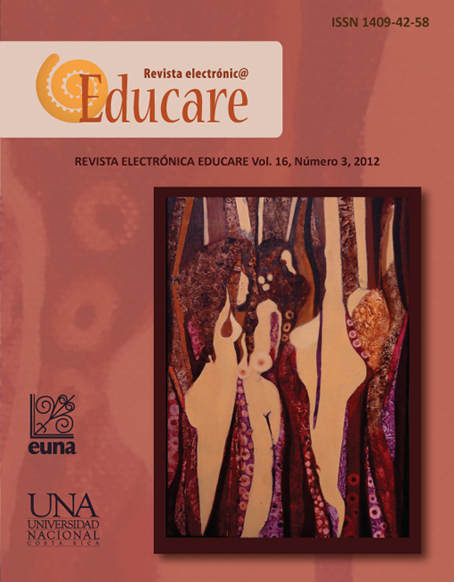Feasibility in Using Technological Resources for Implementing the Environmental Culture Cross-Cutting Factor for Sustainable Development in the Costa Rican Basic General Education
DOI:
https://doi.org/10.15359/ree.16-3.8Keywords:
Teaching strategies, TIC, technological resources, environmental culture, sustainable development.Abstract
The purpose of this research was to analyze whether the use of technological resources may be feasible in the implementation of the environmental culture cross-cutting factor for sustainable development, which focuses on environmental issues related to the contents of the Science study program for the seventh year of the basic general education. The research design is qualitative with a dominant approach and uses some quantitative elements specifically in the design of instruments and some data analysis techniques. The type of study was developed with a multi-method approach; a trend that has been shaping a research style which integrates various methods in a single design. For this, we identified the didactic strategies and their relationship to both, technology and the environmental axis for sustainable development, used by six Science teachers of the 7th grade, in public institutions of the province of Heredia, Central Valley, Costa Rica, as well as the opinion of 20 students from that same grade. The main results include the opinions of the students, who showed a considerable interest in classes where technological resources are used. However, teachers do not show great interest or positive opinions on this matter; in addition, they are not well trained on the use of technological resources. It was also identified that the teaching personal who participated in the study do not develop this curricular axis.
References
Bautista, J. (2007). Importancia de las TIC en el proceso de enseñanza aprendizaje [Mensaje
en un blog]. Recuperado de http://comunidadesvirtuales.obolog.com/importancia-ticproceso-ensenanza-aprendizaje-40185
Boff, L. (19 de marzo, 2007). Calentamiento global y la existencia de una nueva moralidad
(Conferencia inaugural I ciclo lectivo) llevada a cabo en la Universidad Nacional, Heredia,
Costa Rica.
Borderías, M. y Martín, E. (2006). Medio ambiente urbano. Madrid: UNED.
Chadwick, C. (2001). La psicología de aprendizaje del enfoque constructivista. Revista
Latinoamericana de Estudios Educativos, 31(4),111-126. Recuperado de http://redalyc.
uaemex.mx/src/inicio/ArtPdfRed.jsp?iCve=27031405
Delgado, M. y Solano, A. (2009). Estrategias didácticas creativas en entornos Virtuales para el
aprendizaje. Actualidades Investigativas en Educación, 9(2),1-21. Recuperado de http://
revista.inie.ucr.ac.cr/uploads/tx_magazine/virtuales.pdf
Díaz, F. y Hernández, G. (2002). Estrategias docentes para un aprendizaje significativo. Una
interpretación constructivista. (2a
ed.). México: Editorial Mc-Graw Hill.
Galvis, A. H. (junio, 2004). Oportunidades educativas de las TIC. Metacursos soluciones
eLearning innovadoras. Recuperado de http://www.colombiaaprende.edu.co/html/
investigadores/1609/articles-73523_archivo.pdf
González, A. (2005). Las tecnologías de la información y la educación. Observatorio para la
CiberSociedad [Documento en un blog]. Recuperado de http://www.cibersociedad.net/
archivo/articulo.php?art=201
Machado, S. (2002). La importancia de la educación ambiental en la protección de la biodiversidad
de Brasil. Recuperado de http://www.docstoc.com/docs/22268064/La-importancia-de-laeducación-ambiental-en-la-protección
Martínez, R. (2010, enero-junio). La importancia de la educación ambiental ante la problemática
actual. Revista electrónica Educare, 14(1), 97-111. Recuperado de http://www.una.ac.cr/
educare/PDF/PDF-VOL-XIV-N1-2010/11-MARTINEZ-LA-IMPORTANCIA-VIGENTE.pdf
Mestres, L. (2011). Redes sociales y educación: hacia la innovación didáctica. Educaweb.
com. Recuperado de http://www.educaweb.com/noticia/2011/01/31/redes-socialeseducacion-innovacion-didactica-14583.html
Ministerio de Educación Pública. (2005). Programa de estudio ciencias III ciclo. San José, Costa
Rica: Autor
Miranda, C. (2003). Riesgos y aspectos negativos de TIC en educación. Educar.org. Recuperado
de http://portal.educar.org/foros/riesgos-y-aspectos-negativos-de-tic-en-educacion
Olier, K. (s. f.). Efectos de un programa de educación virtual sobre los conocimientos de los docentes
acerca el uso de las nuevas tecnologías de la información y comunicación con fines educativos.
(Tesis de Licenciatura). Barranquilla: Universidad del Norte. Recuperado de http://www.
udenar.edu.co/viceacademica/EDUCACION EN ESPACIOS VIRTUALES/EFECTOS DE UN
PROGRAMA DE EDUCACION VIRTUAL.doc
Palomo, R., Ruiz, J. y Sánchez J. (2006). Las TIC como agentes de innovación educativa. España:
Dirección General de Innovación Educativa y Formación del Profesorado.
Romero, G.-A. (marzo, 2009). La utilización de las nuevas tecnologías como recurso educativo en
el aula. Innovación y experiencias educativas, 16, 1-9. Recuperado de http://www.csi-csif.es/
andalucia/modules/mod_ense/revista/pdf/Numero_16/GUSTAVO ADOLFO_ROMERO_2.
Pérez, G. (2007). Desafíos de la investigación cualitativa. Recuperado de http://www.rmm.cl/
usuarios/pponce/doc/200711151514230.6conferencia_gloria_perez_serrano.pdf
Salgado, C. (2009). Políticas, estrategias y planes regionales, subregionales y nacionales para el
desarrollo sostenible y la educación ambiental en América Latina y el Caribe. Decenio de las
Naciones Unidas de la Educación para el desarrollo sostenible 2005-2014. Santiago: OREAL/
UNESCO. Recuperado de http://unesdoc.unesco.org/images/0018/001819/181906s.pdf
Tonconi, J. (enero, 2010). Factores que influyen en el rendimiento académico y la deserción de
los estudiantes de la Facultad de Ingeniería Económica de la Una-Puno, periodo 2009.
Cuadernos de Educación y Desarrollo, 2(11). Recuperado de http://www.eumed.net/rev/
ced/11/jtq.htm
Downloads
Published
How to Cite
Issue
Section
License
1. In case the submitted paper is accepted for publication, the author(s) FREELY, COSTLESS, EXCLUSIVELY AND FOR AN INDEFINITE TERM transfer copyrights and patrimonial rights to Universidad Nacional (UNA, Costa Rica). For more details check the Originality Statement and Copyright Transfer Agreement
2. REUTILIZATION RIGHTS: UNA authorizes authors to use, for any purpose (among them selfarchiving or autoarchiving) and to publish in the Internet in any electronic site, the paper´'s final version, both approved and published (post print), as long as it is done with a non commercial purpose, does not generate derivates without previous consentment and recognizes both publisher's name and authorship.
3. The submission and possible publication of the paper in the Educare Electronic Journal is ruled by the Journal’s editorial policies, the institutional rules of Universidad Nacional and the laws of the Republic of Costa Rica. Additionally, any possible difference of opinion or future dispute shall be settled in accordance with the mechanisms of Alternative Dispute Resolution and the Costa Rican Jurisdiction.
4. In all cases, it is understood that the opinions issued are those of the authors and do not necessarily reflect the position and opinion of Educare, CIDE or Universidad Nacional, Costa Rica. It is also understood that, in the exercise of academic freedom, the authors have carried out a rogorous scientific-academic process of research, reflection and argumentation thar lays within the thematic scope of interest of the Journal.
5. The papers published by Educare Electronic Journal use a Creative Commons License:















 The articles published by Educare Electronic Journal can be shared with a Creative Commons License:
The articles published by Educare Electronic Journal can be shared with a Creative Commons License: 



